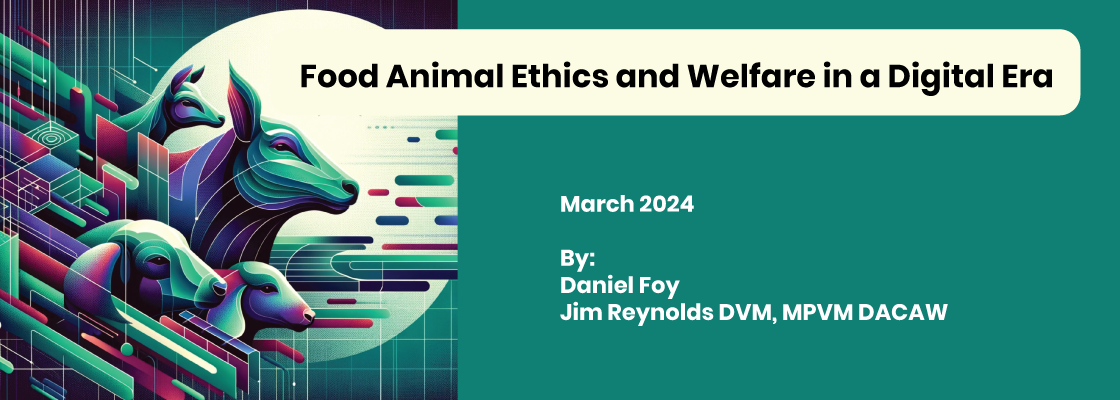By Daniel Foy and Jim Reynolds DVM, MPVM DACAW
As the landscape of consumer preferences and the development of agricultural practices change, a notable and rapid shift towards sustainable practices and improved animal welfare is emerging. However, this transition is fraught with contradictions and challenges such as confusing branding and labeling of products that hinder consumer choices toward products that conform to newer ethical standards for sustainability and animal welfare. Questionable validity of label claims may affect consumer willingness to pay for improved farming standards. This confusion is so pronounced that regulatory bodies like the European Union have felt the need to step in to address misleading animal welfare and environmental claims1. This scenario presents both an opportunity and a challenge for producers in the food-animal agriculture sector. A significant crux of the matter lies in the differing moral compasses of consumers and farms. As consumer understanding of sustainability and welfare evolves, there’s a pressing need for transparency to bridge the gap between farm practices and consumer expectations. Ethics, a system of accepted beliefs governing societal behavior, particularly based on an individual’s morals2, plays a pivotal role in this dynamic. Data emerges as the common ground where farmers can leverage their insights to narrate the story of their products, offering transparency from farm to table through detailed data points, calculations, audits, and certifications.
The reluctance to be perceived as engaging in “bad practices” is universal. No one inherently views their actions as harmful, but traditional agricultural practices are sometimes in conflict with contemporary ethics. This underscores the importance of using data to enhance our understanding of animal welfare and, by extension, the sustainability of livestock practices, where producers can understand the bigger picture of what is happening on-farm. Improvements in animal welfare are not just a moral obligation but a necessity, with data serving as the key to unlocking a deeper understanding of individual animals and their needs. However, the scarcity of standardized welfare metrics and calculations with AgriTech data systems for producers to adhere to necessitates a push toward the identification of these standards by bodies, extension services, and researchers. This initiative is crucial for capturing relevant data, which can then be used for certification purposes and to communicate the value of food animal proteins and nutrient products to consumers.
The conflict between short-term profits and the intrinsic value of animal welfare represents a significant ethical dilemma. Welfare, behavioral, and health systems form just one part of a complex puzzle that also includes navigating toward a new value system where data plays a crucial role. Personal ethics vary widely, influencing decisions around meat and animal product consumption based on animal welfare standards. The use of anthropomorphism is posited as a means to improve understanding of the affective states of animals, guided by the precautionary principle that if something causes harm to humans, it likely harms animals too.
As science in animal sentience and welfare advances, so does our ethical stance on animal welfare, with shifts from acceptance of traditional husbandry practices to wider objections. This evolving ethical landscape necessitates a balance between objectivity (Freedom from bias) and emotionality (capacity to display or be influenced by emotions) among veterinarians, farmers, and consultants, highlighting the need for actionable data to inform welfare improvements.
In this digital era, food animal agriculture is undergoing a transformation that holds the potential to address these challenges. Policy plays a critical role in this transformation, acting as a mediator between the need for improved farm practices and consumer concerns about animal welfare and sustainability. Identifying relevant data for the prevalence of welfare metrics at the individual level is imperative for any policy regulation, especially with digital systems, ensuring the supply and quality of this data to a subsequent standard of measurement. Looking ahead, the future of ensuring good welfare practices lies in connecting the data dots from producers to consumers, emphasizing and verifying livestock agriculture’s role in sustainable food supply and regenerative agriculture.
The application of artificial intelligence (AI) and machine learning (ML) in analyzing behavioral and health data will revolutionize the way we approach animal welfare, offering diagnostic, prescriptive, descriptive, and predictive insights. However, the challenge lies in ensuring that these technological tools are driven by welfare considerations and produce accurate and standardized outputs that genuinely reflect the animals’ well-being. A common data framework for livestock agriculture data at the farm level could provide a structured approach to managing this data ecosystem, facilitating the assessment and flow of data from entry to the application. Such a framework is essential to prevent unverified welfare issues, emphasizing the need for transparency in data points used, quality assessments, and the logged editing of data. Farmers’ ownership of their data, both pre- and post-algorithmic processing, is a critical component of this framework, ensuring that data utilization respects the rights and responsibilities of those at the heart of food production.
In conclusion, the journey towards sustainable and ethically produced food is complex and multifaceted, involving a delicate balance of consumer expectations, regulatory frameworks, ethical considerations, and the transformative potential of technology at the farm level. By embracing transparency, pursuing standardization in welfare metrics, and leveraging the power of data and digital tools, the agricultural sector can navigate these challenges. The ultimate goal is to foster a system that not only supports the ethical treatment of animals and sustainable practices but also aligns with the evolving values and expectations of consumers. This alignment is crucial for the future of food animal agriculture, ensuring that it is both responsible and reflective of our collective moral compass.
1: https://www.theguardian.com/environment/2024/jan/17/eu-bans-misleading-environmental-claims-that-rely-on-offsetting?s=09
2: https://dictionary.cambridge.org/dictionary/english/ethic

